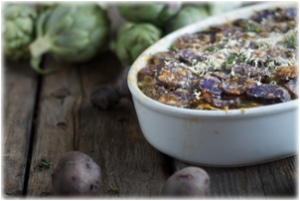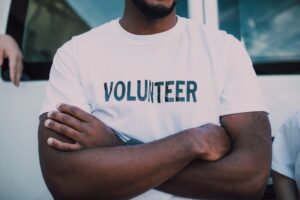 Volunteers are always an essential part of our society, providing their time, money or abilities to help others. When COVID-19 hit our area in March 2020 and life essentially shut down, existing needs became even more apparent and new ones emerged. The virus was scary and brought with it countless unknowns. Many retreated to the safety of their homes, while some put aside their own fears and came forward in unprecedented ways.
Volunteers are always an essential part of our society, providing their time, money or abilities to help others. When COVID-19 hit our area in March 2020 and life essentially shut down, existing needs became even more apparent and new ones emerged. The virus was scary and brought with it countless unknowns. Many retreated to the safety of their homes, while some put aside their own fears and came forward in unprecedented ways.
As author Rick Riordan once said, “Out of every tragedy comes new strength.” That certainly was the case here, where many young volunteers in the Princeton area stepped up this past year. It’s important to recognize this greatness, which not only helped people get by, it ensured some survived. From school-aged to 20-somethings, we’re highlighting some students and graduates who are “Young Rock Star Volunteers” because their courage, attitude and strength deserve our fanatical admiration.
Princeton Mobile Food Pantry
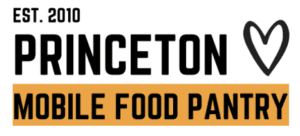 The Princeton Mobile Food Pantry (PMFP) provided food and support to the underserved Princeton community prior to the pandemic, offering a weekly pick-up pantry to over 300 people since 2017 and helping in many other ways for more than a decade. When COVID hit, the pantry shifted to a mobile operation, utilizing volunteers to collect and deliver fresh food to more than 700 recipients. Since April 2020, nearly 130 volunteers have signed up to help through the PMFP website.
The Princeton Mobile Food Pantry (PMFP) provided food and support to the underserved Princeton community prior to the pandemic, offering a weekly pick-up pantry to over 300 people since 2017 and helping in many other ways for more than a decade. When COVID hit, the pantry shifted to a mobile operation, utilizing volunteers to collect and deliver fresh food to more than 700 recipients. Since April 2020, nearly 130 volunteers have signed up to help through the PMFP website.
“PMFP typically has 22-24 rotating volunteers who sign up to help pack and/or deliver at our bi-monthly meetings on Wednesday mornings where we create grocery bags filled with fresh meat, eggs, dairy, fruits and vegetables,” describes Lilliana Morenilla, Princeton Mobile Food Pantry Chair and Founder. “We also have volunteers who cannot meet during the day so we offer lots of options for them to help on their own time. For example, we have friends who volunteer to fundraise for us by selling homemade cookies or dog biscuits online. Others have done drives (ie. dry beans, sanitary items, summer items, toothpaste, blankets, etc.) through their social networks, religious groups, sports teams, and neighborhoods. Volunteers have also reached out to help us with grant writing, or making connections to local farms and businesses, promotion through social media and new outlets.”
Rohan Sheth, a 15-year-old Hun student, first got involved two years ago by following along with his mother, Shilpa Pai. When the pandemic hit and the needs increased, so did his commitment. He began accompanying his mom weekly.
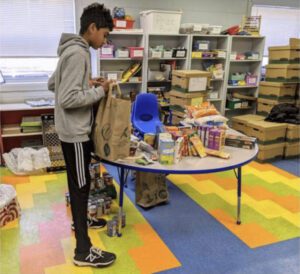 “What we would do is pack grocery bags full of food every Wednesday and then take them, in our cars, to people in and around Princeton who needed help the most,” explains Sheth. “As the summer went on, more and more people started helping out and the whole process was just accelerated and became more efficient. While I only helped out on certain days, there was also so much work happening behind the scenes that I got to see happen through my mom.”
“What we would do is pack grocery bags full of food every Wednesday and then take them, in our cars, to people in and around Princeton who needed help the most,” explains Sheth. “As the summer went on, more and more people started helping out and the whole process was just accelerated and became more efficient. While I only helped out on certain days, there was also so much work happening behind the scenes that I got to see happen through my mom.”
Sheth was not the only young volunteer. Ryan (age 18) and Kyle (age 14) Grzymala had been operating their own charity for seven years when they joined forces with the Princeton Mobile Food Pantry.
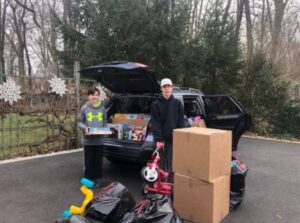 Ryan was turning 11 when he asked for gently used toys for his birthday rather than new gifts. Noticing a shortage of good toys and activities for indoor recess at his school, Riverside Elementary, Ryan cleaned, organized and then distributed the used toys he received to the teachers around school. He then convinced his younger brother Kyle to do the same and R+K=Toys was born. Over the years, 1000s of toys have been collected with donations from and benefitting all four Princeton elementary schools and a freecycle event, enhancing the indoor recess and learning environment for all Princeton students. Unopened toys were also provided to Homefront to give out for the holidays. Seeing all the joy the toys brought to kids, the duo decided to rename their operation R+K=Smiles.
Ryan was turning 11 when he asked for gently used toys for his birthday rather than new gifts. Noticing a shortage of good toys and activities for indoor recess at his school, Riverside Elementary, Ryan cleaned, organized and then distributed the used toys he received to the teachers around school. He then convinced his younger brother Kyle to do the same and R+K=Toys was born. Over the years, 1000s of toys have been collected with donations from and benefitting all four Princeton elementary schools and a freecycle event, enhancing the indoor recess and learning environment for all Princeton students. Unopened toys were also provided to Homefront to give out for the holidays. Seeing all the joy the toys brought to kids, the duo decided to rename their operation R+K=Smiles.
When COVID hit, their collections shifted to curbside pickups and Ryan and Kyle decided to partner with Princeton Mobile Food Pantry to help with that operation as well as to find a new way to distribute their toys.
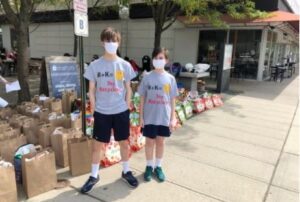 “We are working with a new organization and our goal is to recycle 200+ items a month for kids who would really like new things to play with,” shares Ryan. “Plus, it helps to keep stuff out of the landfill.”
“We are working with a new organization and our goal is to recycle 200+ items a month for kids who would really like new things to play with,” shares Ryan. “Plus, it helps to keep stuff out of the landfill.”
Over the years R+K=Smiles has also coordinated their efforts with the Princeton Public Library and Sustainable Princeton.
Sustainable Princeton
 Since 2012, Sustainable Princeton has been working to inspire the community in ways that positively impact our environment. Throughout the past year, when priorities for many shifted to a more personal survival mode, Sustainable Princeton powered forward with initiatives they hope will have long-lasting effects on the survival of our community-at-large.
Since 2012, Sustainable Princeton has been working to inspire the community in ways that positively impact our environment. Throughout the past year, when priorities for many shifted to a more personal survival mode, Sustainable Princeton powered forward with initiatives they hope will have long-lasting effects on the survival of our community-at-large.
A recent graduate of Rider University who grew up in Princeton’s Witherspoon Jackson neighborhood, Samuel Garcia volunteers his time with the organization. He learned the importance of volunteering from his parents during his middle school years and it stayed with him.
“I really enjoy walking through the Pettoranello Gardens with my family and the heavy amounts of littering continues to be alarming,” recalls Garcia. “That is what motivated me to attend a Sustainable Princeton presentation and ultimately changing my lifestyle.”
Garcia has been volunteering with Sustainable Princeton ever since and after two years, recently got promoted to Intern.
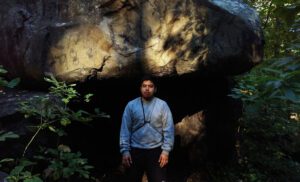 “Whether Samuel is helping with a neighborhood cleanup, giving a presentation about the health impacts of climate change, or helping sign up Princeton residents for an emergency notification program, he does it with quiet humility and genuine care about his community,” shares Christine Symington, Sustainable Princeton Program Director.
“Whether Samuel is helping with a neighborhood cleanup, giving a presentation about the health impacts of climate change, or helping sign up Princeton residents for an emergency notification program, he does it with quiet humility and genuine care about his community,” shares Christine Symington, Sustainable Princeton Program Director.
The major initiative Sustainable Princeton has taken on this past year is Changing the Landscape: Healthy Yards = Healthy People. The project’s goal is to encourage landscaping practices that are healthier for workers and the environment. Sustainable Princeton is working together with other local organizations and the community, and Garcia is playing a key role.
“He continues to provide valuable insight into the culture and values of our local Hispanic community to inform our efforts,” notes Molly Jones, Sustainable Princeton Executive Director.
Housing Initiatives of Princeton
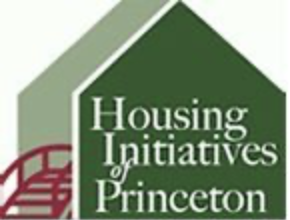 Also working with our local Hispanic community as a bilingual speaker of English and Spanish, Guillermo Herrera Nimmagadda was finishing his first semester as a graduate student at Princeton University this past December when he jumped right into a volunteer role with Housing Initiatives of Princeton (HIP).
Also working with our local Hispanic community as a bilingual speaker of English and Spanish, Guillermo Herrera Nimmagadda was finishing his first semester as a graduate student at Princeton University this past December when he jumped right into a volunteer role with Housing Initiatives of Princeton (HIP).
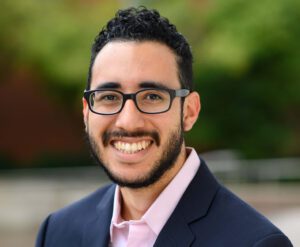 “I knew the pandemic had led to a severe housing crisis. Because I was frequently in contact with Spanish-speaking residents, it also meant I could serve my Latinx community, which had been disproportionately hurting from COVID-19,” says Herrera Nimmagadda.
“I knew the pandemic had led to a severe housing crisis. Because I was frequently in contact with Spanish-speaking residents, it also meant I could serve my Latinx community, which had been disproportionately hurting from COVID-19,” says Herrera Nimmagadda.
HIP has been offering affordable rental opportunities (transitional housing) and services to help low-income working families stay in the area since 2004. The organization recently received a State grant to provide rental assistance and Herrera Nimmagadda was able to help local Spanish-speakers apply and benefit from this and the county offerings as well.
“When Mercer County had announced its Emergency Rental Assistance Program, there was only an English form available to apply,” shares Herrera Nimmagadda. “Jeff Simon and I had decided to create an unofficial Spanish version of the form to make it easier for Latinx residents to apply, in which they filled out the unofficial form in Spanish and we then submitted the official form in English on their behalf. Soon thereafter, Mercer County actually adopted our Spanish translation and uploaded a Spanish version of the application because Carol Golden at HIP had informed them of our translation.”
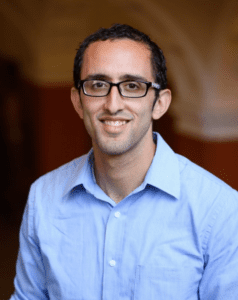 Simon began volunteering with HIP in December as well, and along with Herrera Nimmagadda helps the organization sort through applications to grant assistance. At 34-years old, Simon is slightly older than some of our other Rock Star Volunteers, but his joint efforts with Herrera Nimmagadda warrant a mention. Simon is not a native Spanish speaker but learned the language through courses at his public schools and in his years at the University of Michigan. After teaching amongst immigrant communities for several years, Simon decided to go back for a degree as an immigration lawyer (he has one more year of school to go) and now advocates for opportunities.
Simon began volunteering with HIP in December as well, and along with Herrera Nimmagadda helps the organization sort through applications to grant assistance. At 34-years old, Simon is slightly older than some of our other Rock Star Volunteers, but his joint efforts with Herrera Nimmagadda warrant a mention. Simon is not a native Spanish speaker but learned the language through courses at his public schools and in his years at the University of Michigan. After teaching amongst immigrant communities for several years, Simon decided to go back for a degree as an immigration lawyer (he has one more year of school to go) and now advocates for opportunities.
“The pandemic has taken a serious toll on our undocumented neighbors, who receive very little federal and state assistance,” explains Simon. “There’s a lot of suffering out there, a lot of people can’t pay their rent because they lost their jobs – many because they were laid off as a result of the pandemic, but others had to stay home with their children who were doing school remotely, and still others were taking care of relatives.”
Princeton Mutual Aid
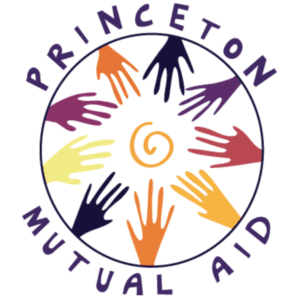 Simon also gives his time to Princeton Mutual Aid (PMA) where he volunteers alongside Nymisha Herrera Nimmagadda, Guillermo’s wife.
Simon also gives his time to Princeton Mutual Aid (PMA) where he volunteers alongside Nymisha Herrera Nimmagadda, Guillermo’s wife.
PMA provides support to those in our community that need it. This could be in the form of food, money and medicine or the assistance of job opening information, providing COVID essentials like masks or vaccine access and offering other advocacy and assistance.
Nymisha and Guillermo moved here in the midst of the pandemic last fall, and she immediately began helping through PMA to bag groceries and deliver them to local seniors.
“Through these encounters and other interactions, it became evident that not all neighbors in Princeton had the same access to resources. There was only one free testing site within walkable distance in town and it only provided testing once a week for a 2-hour window,” notes Nymisha. “By contrast, all university affiliates participated in a regular protocol of testing twice per week at no cost. It is unjust that the rest of the town’s inhabitants had only one extremely limited option for testing, even as they share the same streets, stores, restaurants, and places of worship with the university community. They shared the risks but had none of the same safety measures.”
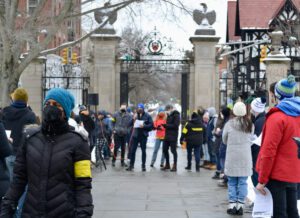 In conjunction with other local organizations, 29-year old Nymisha sought out to form an action group which protested with 200 community members and submitted a petition of nearly 900 signatures to encourage Princeton University to share its COVID resources with the greater community.
In conjunction with other local organizations, 29-year old Nymisha sought out to form an action group which protested with 200 community members and submitted a petition of nearly 900 signatures to encourage Princeton University to share its COVID resources with the greater community.
“In April, the University decided to expand its COVID testing and vaccination to the whole town of Princeton. Additionally, we attended the Board of Health meetings and highlighted to the Health Department as well as the Board how the vaccine rollout was inequitable and leaving communities of color behind. The Health Department has now implemented community clinics at local venues as well as in the neighborhoods,” explains Nymisha.
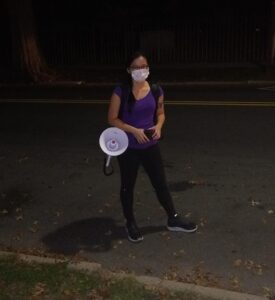 Like Nymisha, Shuk Ying Chan felt her status as a Princeton University graduate student was providing her a safety net that others in the greater Princeton community were not privy to.
Like Nymisha, Shuk Ying Chan felt her status as a Princeton University graduate student was providing her a safety net that others in the greater Princeton community were not privy to.
“I wanted to do something to help turn this moment of crisis into something more hopeful,” Chan shares.
She joined PMA as it was just starting out in April 2020, and in addition to assisting with daily basic necessities, has become an activist for others.
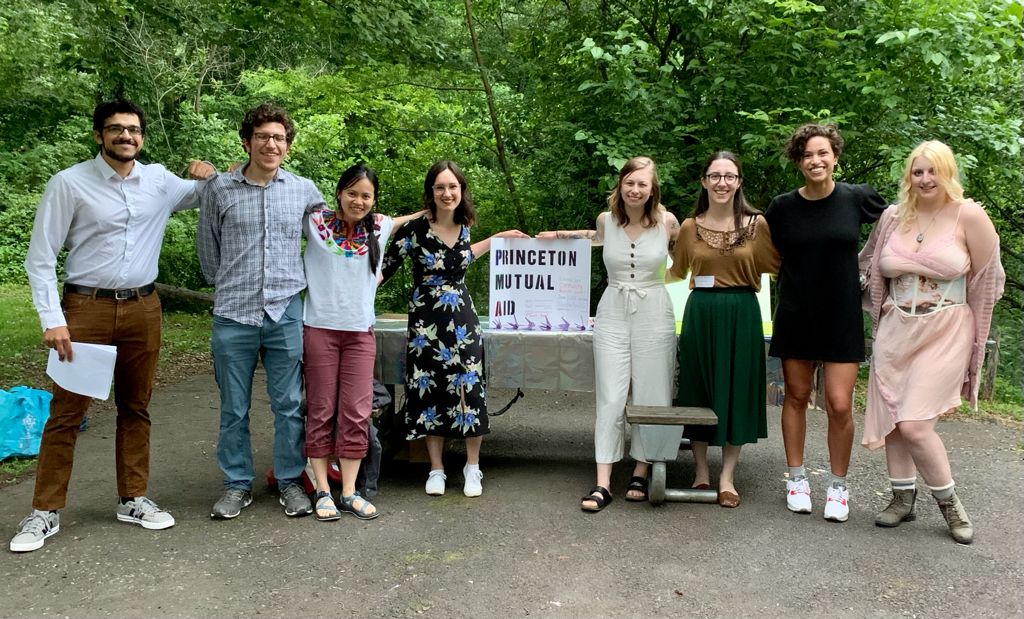 “Through my work with PMA, I came into contact with contract workers at PU who had been furloughed without pay, and who had basically been abandoned by the university as soon as their labor was no longer needed, at a time of unprecedented crisis. We were outraged by this, and as a student at the university I felt an extra moral obligation to stand in solidarity with the workers whose labor makes the university and its activities possible,” Chan recalls. She then worked with a team of people to pressure the University to change its ways. “We mobilized students and PMA members to speak out at university townhalls, organized a petition of solidarity, helped the student newspaper with their investigative report on the issue, worked with union organizers.”
“Through my work with PMA, I came into contact with contract workers at PU who had been furloughed without pay, and who had basically been abandoned by the university as soon as their labor was no longer needed, at a time of unprecedented crisis. We were outraged by this, and as a student at the university I felt an extra moral obligation to stand in solidarity with the workers whose labor makes the university and its activities possible,” Chan recalls. She then worked with a team of people to pressure the University to change its ways. “We mobilized students and PMA members to speak out at university townhalls, organized a petition of solidarity, helped the student newspaper with their investigative report on the issue, worked with union organizers.”
To further help those in town, Chan regularly attends public meetings of the municipal government to be a voice for various causes.
JFCS of Greater Mercer County
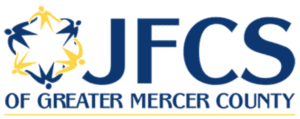 Helping others by empowering them to help themselves, Jewish Family & Children’s Service (JFCS) is an organization that has been assisting the community through a variety of social services offerings and programs since 1937. Two of its programs to help older adults are Kosher Meals on Wheels and Healthy @ Home Senior Shopper program.
Helping others by empowering them to help themselves, Jewish Family & Children’s Service (JFCS) is an organization that has been assisting the community through a variety of social services offerings and programs since 1937. Two of its programs to help older adults are Kosher Meals on Wheels and Healthy @ Home Senior Shopper program.
22-year-old Matt Erman saw how others were giving back during the pandemic and wanted to do his part. He’s been volunteering with various organizations since his Eagle Scout years and decided in October to deliver the meals and shop for seniors.
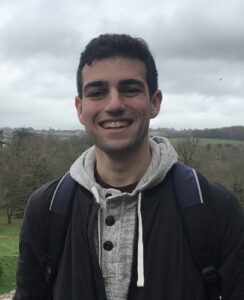 “When you get to see the same people each and every week, you get to really know them, and a simple food drop off can often turn into a 15-minute conversation,” says Erman.
“When you get to see the same people each and every week, you get to really know them, and a simple food drop off can often turn into a 15-minute conversation,” says Erman.
For example, there’s Iris in East Windsor, who shares her grocery lists with Erman and so much more.
“Over the past months, we have become a fixture of both our lives – she asks about my sister or how my law school search has been going, and I ask about her grandkids and her friends,” Erman shares. “The people have been my favorite part of working with JFCS and interacting with Iris is definitely something I look forward to each week.”
Erman’s efforts awarded him JFCS Volunteer of the Month alongside fellow 22-year-old Lucian Chown.
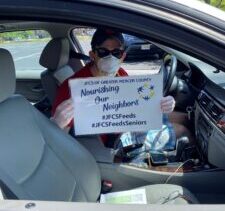 Lucian first learned to volunteer by raising and training puppies with his family at the age of ten. He also gained insight about giving back to the community in high school through a teen philanthropy program he took part in called Jewish Community Youth Foundation (JCYF), offered by JFCS. The pandemic sent him to work from home in NJ and he wanted to give back in this time of need. So Chown started delivering for Kosher Meals on Wheels. When he made his first delivery, it was the first time he’d left the house in three months.
Lucian first learned to volunteer by raising and training puppies with his family at the age of ten. He also gained insight about giving back to the community in high school through a teen philanthropy program he took part in called Jewish Community Youth Foundation (JCYF), offered by JFCS. The pandemic sent him to work from home in NJ and he wanted to give back in this time of need. So Chown started delivering for Kosher Meals on Wheels. When he made his first delivery, it was the first time he’d left the house in three months.
“JFCS operated under strict COVID-19 precautions, and the individuals I delivered to were also respectful. Human interaction for Meals on Wheels is minimal, although meaningful, and mostly done outside which certainly alleviated a lot of my concerns,” Chown explains. “One man shouts his thanks through the door each week. That always makes me smile!”
Erman and Chown are amongst the 200 volunteers that help JFCS provide mobile and pick-up food pantries, senior services, youth programs, counseling services and more. At a time when strong and willing volunteers were really needed, they have stepped up.
“These particular volunteers are motivated by an obvious sense of responsibility and a desire to do their part to repair the world,” boasts Eden Aronson, JFCS Volunteer Coordinator. “Their work ethic and unlimited availability has helped immeasurably at a time when many volunteers have been careful about being out in the world. We are so fortunate to be the recipient of their loyalty.”
Arts Council of Princeton
 To be out in the world during the pandemic, one needed a mask…and that is what led Arts Council of Princeton to launch its Sew Many Masks campaign last March, which aligns perfectly with its mission to build community through the arts.
To be out in the world during the pandemic, one needed a mask…and that is what led Arts Council of Princeton to launch its Sew Many Masks campaign last March, which aligns perfectly with its mission to build community through the arts.
“At that time masks were hard to come by, and our community rallied around this effort by donating fabric and picking up kits to sew masks,” details Melissa Kuscin, Arts Council of Princeton’s Program/Marketing Manager. “In the end, our volunteers helped us create almost 2,000 fabric masks that were then distributed to anyone who needed them, free of charge.”
The masks were passed out at soup kitchens and distribution sites around the community, to ensure the most vulnerable populations were protected. Their creations came from a combination of volunteer efforts, with some donating fabric, others pre-cutting and more sewing. Adults and children chipped in, including a local Girl Scout troop.
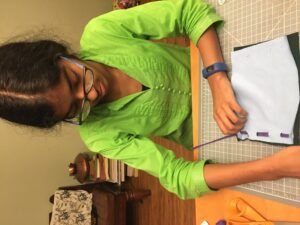 “The Arts Council’s Sew Many Masks project gave our troop a chance to use the sewing skills we learned in Girl Scouts during middle school and helped many people in our community,” recalls 16-year old Bhavana Thelakkat. “We sewed masks, made t-shirts masks and t-shirt yarn at home. I also enjoyed creating videos for Sew Many Masks to help others learn how to contribute as well. Overall, this project was a great experience as it helped to make a positive impact on so many people!”
“The Arts Council’s Sew Many Masks project gave our troop a chance to use the sewing skills we learned in Girl Scouts during middle school and helped many people in our community,” recalls 16-year old Bhavana Thelakkat. “We sewed masks, made t-shirts masks and t-shirt yarn at home. I also enjoyed creating videos for Sew Many Masks to help others learn how to contribute as well. Overall, this project was a great experience as it helped to make a positive impact on so many people!”
And what a positive impact these girls and all of our Rock Star Volunteers have made. In a year that was difficult for so many, it’s nice to know there are people in our community we can count on.

Lisa Jacknow spent years working in national and local news in and around New York City before moving to Princeton. Working as both a TV producer and news reporter, Lisa came to this area to focus on the local news of Mercer County at WZBN-TV. In recent years, she got immersed in the Princeton community by serving leadership roles at local schools in addition to volunteering for other local non-profits. In her free time, Lisa loves to spend time with her family, play tennis, sing and play the piano. A graduate of the S. I. Newhouse School of Public Communications at Syracuse University, Lisa was raised just north of Boston, Massachusetts but has lived in the tri-state area since college. She is excited to be Editor and head writer for Princeton Perspectives!
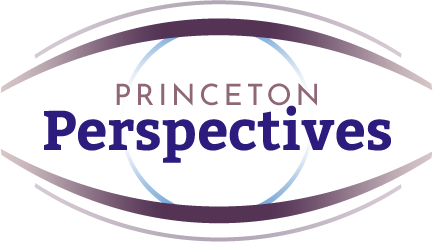
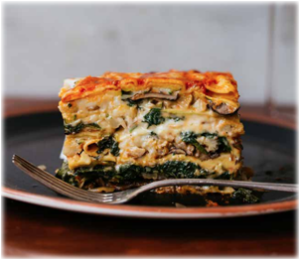 Ingredients:
Ingredients: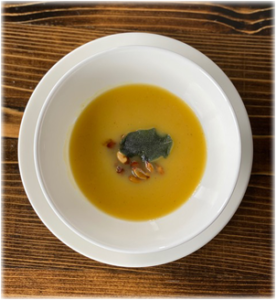 Ingredients (4-5 servings)
Ingredients (4-5 servings)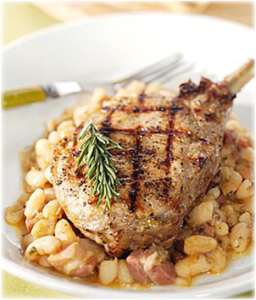
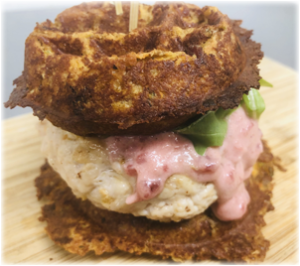 Ingredients:
Ingredients:
